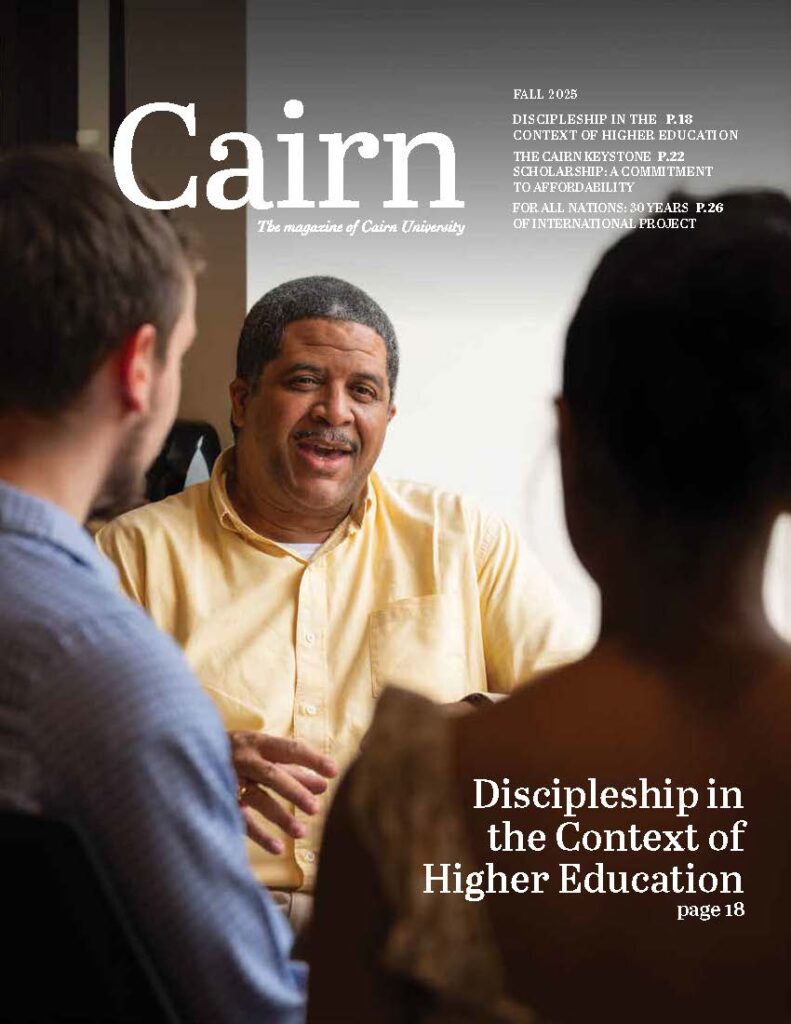Colossians 1:28 offers a concise and compelling summary of Christian discipleship: “Him we proclaim, warning everyone and teaching everyone with all wisdom, that we may present everyone mature in Christ.” The aim of Christian discipleship, and indeed the purpose of Christian education, is not simply information transfer but spiritual transformation. At its heart, education should be about formation not transaction. Discipleship within higher education is not a side project or an extracurricular benefit; it is central to the mission. At its best, Christian higher education is a formative enterprise that shapes students not only intellectually and professionally but also spiritually and morally, guiding them toward maturity in Christ.
This perspective reframes what we consider to be academic success. The goal of discipleship-oriented education is not credentialing or a high GPA. It is not financial gain, job security, or even professional competence. Although these are all worthy endeavors, and some are even stated outcomes of our university’s education, the fundamental goal is spiritual maturation. We seek to present students mature in Christ. Discipleship does not displace these other goals; rather, it orients and reorders them within the larger purpose of living as God’s image bearers.
Christian colleges and universities have long recognized that institutions do more than inform. They form us. Through their practices, habits, community structures, and cultural rhythms, institutions shape the hearts, values, and identities of those who participate in them. Therefore, when Christian educators engage in their calling, they are doing more than teaching content or preparing students for a career. They are discipling. They are engaged in a sacred task of forming students through modeling, mentoring, and instructing.
Discipleship in higher education is deeply relational. This is why we often say to faculty and staff, “Model what you want from your students.” You cannot teach humility without being humble. You cannot cultivate integrity without being genuine and honest. This happens through how our faculty members teach, how they advise, how they grade, and how they interact with their colleagues and students. Students learn as much from our manner as from our material. As David I. Smith reminds us, “Moral formation and the imitation of Christ are nothing new, even if their challenges must be taken up anew by each of us. The practices, disciplines, and virtues that shape good character have been part of the conversation in the Christian tradition for centuries.”
There is perhaps no better context for deepening biblical understanding and theological commitment than a university committed to teaching from a distinctly Christian worldview. Young men and women are most likely to grow in their knowledge of Scripture and Christian doctrine within a setting that offers rigorous academic instruction, exposure to faculty members who are deeply invested in the spiritual lives of their students, time for deep reflection, and a space intentionally designed to foster meaningful learning and spiritual formation.
These institutions give students the opportunity to learn from scholars who are not only experts in their academic disciplines but models of faith and integrity. The relationship between a student and a faculty mentor is uniquely powerful. Professors do not merely lecture. They shepherd, advise, correct, and encourage. When professors view their teaching through the lens of discipleship, every conversation becomes a moment of spiritual influence and every lecture a chance to invite students into fuller Christian maturity. In this kind of setting, students are consistently challenged and equipped to think biblically about the church, society, and the world we live in.
At Cairn University, we speak frequently about biblical integration. This is not a method for tacking on Scripture references to lectures or decorating syllabi with isolated verses. It is a serious theological and pedagogical commitment. At its core, biblical integration is a means of discipleship within God’s redemptive story. It is the faithful pursuit of academic inquiry under the authority of Christ, shaping both the intellect and the affections of students. Integration is not something the faculty manufacture or figure out how to achieve; it is something already present in Christ, who holds all things together. Faculty members do not create integration. Instead, they help students discover the beautiful coherence that already exists between the gospel and their academic and professional pursuits.
This kind of integration is transformative. It aligns students with a Christ-centered vision of reality, one that reflects the grand narrative of Creation, Fall, Redemption, and Consummation. As faculty members articulate and model this integration, they disciple students within the historical-redemptive framework of the gospel, equipping them to think and live in light of Christ’s ongoing redemptive work.
David S. Dockery writes, “Christian educators recognize that the Christian faith is more than a moral guide or warmhearted devotional practices or service projects—our faith must influence how we act, what we believe, what we think, how we teach, how we lead, and how we treat one another.” This kind of influence is what biblical integration is after. At Cairn, we do not merely add a Christian perspective to an academic discipline. We recognize that all wisdom and knowledge are found in Christ (see Col. 2:3) and that “All truth is God’s truth” (St. Augustine). Our commitment to biblical integration shapes the entire learning environment, including our teaching, research, advising, mentoring, and participating in community life.
One of the dangers in Christian higher education is the compartmentalization of theology from other disciplines. When theology is separated from fields like business, science, or education, students may learn, whether intentionally or unintentionally, to disconnect their faith from their vocation. Biblical integration emphasizes that faith and learning are interconnected. Students must come to see their work in education, engineering, or psychology as integral to their Christian calling.
This is why the faculty must be adept at integrating biblical principles about stewardship, family, and an anthropology rooted in the Imago Dei within the learning process. For example, in a business course, the professor might frame business as an act of love for neighbor and stewardship before God. Economics can be understood not merely as data analysis or resource management but as participation in a moral and theological vision of human flourishing. In this context, biblical integration is not optional; it is central to discipling students to live out their faith in the world.
At Cairn University, we believe that a faculty member’s ability to model and implement this kind of discipleship-oriented education is not peripheral—it is essential. Faculty members are not simply subject-matter experts. They are mentors and disciple-makers. Because of this, we now explicitly tie faculty rank promotion to a professor’s ability to think about, articulate, and practice a discipleship model of education.
Faculty members who seek promotion are asked to articulate their philosophy of biblical integration in their discipline. They must wrestle with questions like: What difference does it make to teach at Cairn University? What formation can I provide that the internet or artificial intelligence cannot? How can I model Christian discipleship in my classroom and faculty-student interactions? How do I mentor students in a way that supports their spiritual growth as well as their academic development?
This is why our faculty development courses focus on cultivating a biblical foundation for academic work and fostering a culture of discipleship in Christian higher education. We are committed to equipping the faculty to engage in teaching and scholarship that reflect both academic excellence and theological depth. These courses are developed and assessed, under the direction of the Provost’s Office, by the University Faculty Rank Committee, which is composed of full professors.
The present reality in higher education is that students are changing. Students are increasingly entering college underprepared for the academic demands of higher education. Many lack institutional capital and social-emotional maturity. Faculty members now find themselves not only teaching content but also remediating basic skills, addressing emotional needs, and guiding students toward responsible behavior.
There are many sociocultural factors that contribute to these changes—a conversation that is complex and deserves far more explanation that can be given here. But the fact remains that the days when professors could focus only on delivering a great lecture, if they ever truly existed, are now behind us. Today, it is more important than ever that faculty members hold students to high expectations while also discipling the students they have, not the ones they wish they had or remember from a different time. This commitment requires patience, grace, and the embodiment of discipleship in teaching and interactions. Setting high standards challenges students to grow and reflects a deep investment in their spiritual and academic development.
We must also commit to creating classroom environments that are both rigorous and relational—spaces where students can wrestle with hard questions, encounter new ideas, and receive encouragement and correction from trusted mentors. When done well, this kind of education not only informs students but transforms them.
At the heart of all of this is a vision for a culture of discipleship in Christian higher education. This culture is not sustained by curriculum alone. It is maintained by people: faculty, staff, and administrators who understand their roles as disciple-makers and influencers of campus culture. A faculty member’s greatest legacy may not be publications or lectures but the lives of students who were formed under his or her care.
A disciple-making university does not shy away from academic rigor or professional preparation. But it refuses to treat these as ends in themselves. Instead, it frames them within the larger purpose of shaping Christlike character and cultivating wisdom. This is what it means to pursue spiritual maturation as the central goal of education. This is what it means to proclaim him, “warning everyone and teaching everyone with all wisdom, that we may present everyone mature in Christ.”
At Cairn University, we are striving to build such a culture—not perfectly, but intentionally. We believe that Christian higher education, when grounded in biblical truth and animated by a commitment to discipleship, can produce not only competent professionals but mature believers who carry the gospel into every corner of society.
This is the task before us. May we individually and corporately commit to this mission.










